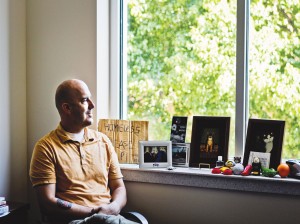Garold LaRue agrees. Co-owner of Avoca Coffee, a popular hangout on the Near Southside, he said he has no problem with a state or federal minimum wage increase, but he’d have to raise prices to cover it.
“I wish that I could always pay a living wage to employees, but with my business, that’s not possible at the current time,” said the burly, bearded LaRue. “Avoca employees start above minimum wage and have the benefit of tips. Tipping does supplement wages.”

But, he added, “Most minimum-wage positions don’t earn tips.”
LaRue thinks there are pros and cons to a minimum wage increase. Some small businesses will have to “staff down,” he said, but the remaining employees will make more money, which is good.
“The minimum wage, in my opinion, is a starting point,” said Haltom City councilman and small business owner Trae Fowler. “It’s designed for entry-level positions. If people work hard, they become a more valued employee. I don’t think the federal government should get involved in it.”
Fowler thinks raising the minimum wage could hurt small businesses in Texas because it will force the owners to pay everyone higher wages, which, he said, would increase costs across the board.
At Catholic Charities of Fort Worth, all 368 employees earn at least $13 an hour. The nonprofit made a commitment to pay every employee a living wage plus benefits as part of its mission to eliminate poverty.
That hourly rate has made a big difference in the life of Anand Pradhan, a 28-year-old Bhutanese refugee who works as a mechanic on buses and cars in the Catholic Charities fleet.
Before joining the nonprofit, Pradhan made $10 an hour working in the service department at Frank Kent Honda. He got his new job thanks to an automotive certificate he earned at Tarrant County College with the help of Catholic Charities’ vocation program. That raise means an extra $460 a month for the soft-spoken, stylishly clad Haltom City resident.
Now, he said, “I don’t have to carry a lunch bag when I go out to work. Sometimes I can go out to eat.”
The extra income allows him to save money to pursue his dream of owning a gas station.
Pradman and his wife don’t have any kids yet, which means they don’t have to worry about another mouth to feed or daycare. They both work full-time, although his wife makes a lot less than he does. But with their combined incomes, they’re living well above the poverty line. And when they’re ready to have kids, they’ll be better financially prepared to handle the daunting costs of daycare.
Right now, Schmelzle is paying a neighbor to watch her 4-year-old during the day, which is the best option Schmelzle can afford.
A new study from Camp Fire First Texas, a youth development nonprofit in Fort Worth, reports that families pay more than $8,000 a year to have a toddler in licensed daycare full-time in Tarrant County. So the cost for three kids could be more than $20,000 a year. Schmelzle makes less than $12,000.
“Quality childcare is virtually out of reach for a woman whose hourly wage is below $16 an hour,” said Carol Klocek, CEO of YWCA of Fort Worth, in an e-mail.
For childcare, she continued, low-income women must rely on family assistance or government subsidies through the Child Care Management System, an arm of the Workforce Development Board that serves families in Tarrant County.
“Without childcare,” Klocek continued, “they can’t afford to work, but because of the high cost of childcare, they find it harder to afford to live. This is increasing the vulnerability of these families and making it more likely for them to fall into periods of homelessness.”
Schmelzle has been on the CCMS waiting list since August. There are about 3,000 kids on that list each month in Tarrant County. And there are a lot of families who fall right in the middle of the income bracket, explained Lyn Lucas, vice-president of Camp Fire’s work and family division. “They don’t qualify for help but can barely afford to pay for it as it is,” she said.
So in many cases, those families are forced to choose lower quality care for their kids. And that can be incredibly detrimental because “85 percent of brain development happens by age 3,” Lucas said.
******
Even with a federally mandated raise in the minimum wage to $10.10 an hour, there’s still some debate if it would constitute a living wage, Cooper said. One adult working full-time at $10.10 an hour makes about $21,000 a year (before taxes). The poverty line for a family of two — a mother and child, for example — is about $16,000 a year. The poverty line for a family of four is a little more than $24,000.
To cover the basic costs of living in North Texas, one parent supporting one child would need to make at least $20.83 an hour, according to CPPP’s Family Budget Estimator. That hourly rate assumes the employer doesn’t cover health insurance and that the adult is working full-time. That rate also doesn’t leave a dime for savings — so one flat tire or fender bender could send a family into financial crisis.
Living with the day-to-day stress of not having enough money takes a serious mental toll on adults and their children, explained Dr. Jacquelyn Gamino, assistant research professor at the School of Behavioral and Brain Sciences at The University of Texas at Dallas.

“Poverty has a lot of detrimental effects,” she said.
For kids, not knowing if you’re going to have enough food to eat that week or living in a hostile environment is very stressful. That stress can slow a child’s brain development, Gamino said.
The culprit is cortisol: a hormone the body produces in stressful situations. Too much of it can cause deterioration in parts of the brain, Gamino said.
The mental effects of poverty can be seen inside the classroom too, as kids exhibit less cognitive control, meaning they find it harder to sit still and pay attention, which can make learning difficult.
But it doesn’t have to be that way. Gamino’s research shows that living in poverty doesn’t mean you’re doomed.
“The brain is very plastic and can change,” she said. “It gives us a lot of hope of how to help people out of those cycles.”
The school’s cognitive training program (SMART) benefits kids from all socioeconomic backgrounds and gives kids living in poverty the power to “catch up” with their peers, Gamino said.
For parents, playing with kids doesn’t require any money and can be good for mental and emotional development. But adults need the time and emotional capacity to do so, she added.
Time and emotional capacity are resources in short supply when all a parent can think about is how she’s going to pay for the next meal or water bill.
“The immediate need to make money overrides everything else,” explained Dr. James Petrovich, assistant professor of social work at Texas Christian University.
The brain on poverty acts differently, Petrovich said. It’s in a constant state of need, making long-term goals such as saving money or going back to school especially difficult.
******











It’s tough out there these days and I feel like a lot of older people who grew up when things were different can not see it so they remain stuck in conservative ideologies that just don’t work anymore. Every time I hear someone may a claim that in America if you work hard, you can be or have whatever you want., I want to scream! It is just not true anymore. Great piece!
No political ideology works anymore. The cost of big government programs is ultimately passed on to the consumers and citizens, no matter what, vastly escalating the cost of living –which is the real problem here. The cost of a higher education is also out of control thanks to predominately liberal universities being able to screw college students and their parents any way they want. Politicians go to Washington and get systemically bribed by lobbyists to vote for more big industry breaks and bail outs at the expense of the average person. It is discouraging.
Thank you, Sarah Angle, for shedding light on one of the egregious injustices taking place in the 21st century. The comment, “No political ideology works anymore”, is right on the mark. A small piece of legislation here or there will not address the vast disparities that exist in our society – people dying of hunger in a world of plentiful food, others needing proper housing, healthcare, or education to live decent lives. Clearly our leaders in office don’t understand the severity of the crises or how to fix them.
I’m with a worldwide network of volunteers, Share International, who sees this moment as a critical turning point for our civilization. We are aware of an extraordinary teacher who is incredibly wise and deeply concerned about the welfare of ALL humans…who will point the way forward…and who will inspire us, through our hearts, to work together to demand our politicians to make drastic changes. Maitreya is this teacher’s name, and he will be calling on TV for humanity to share together the food and basic resources of our planet. The signs of his gradual public emergence are numerous and documented in magazines, newspapers, videos and press releases over the last couple decades.
For anyone interested in a hopeful outlook on the future, we will be offering two presentations in June on this story that has intrigued and inspired millions worldwide already: “How do we fix our broken world?” – June 13 & 20 (Dallas Angelika Film Center and Richardson Civic Center)
More info: share-international.us/events